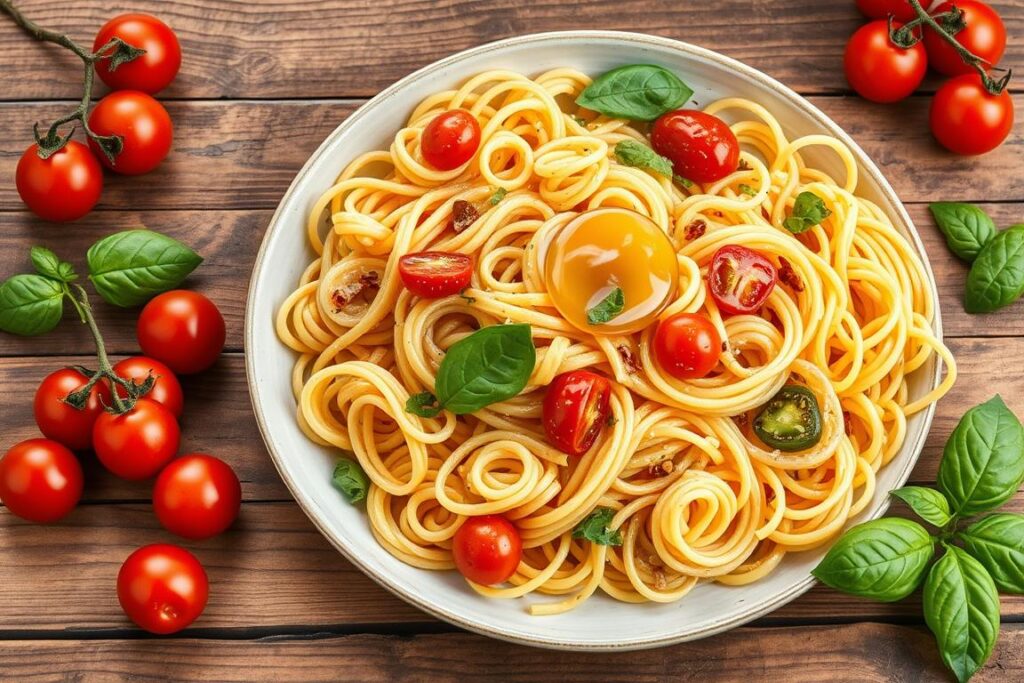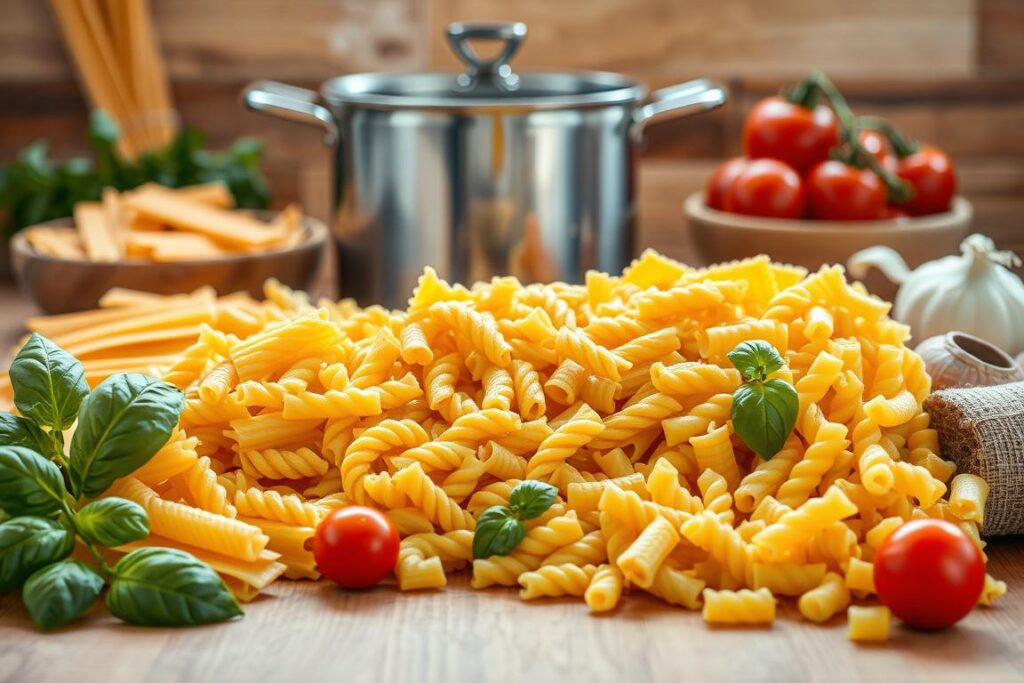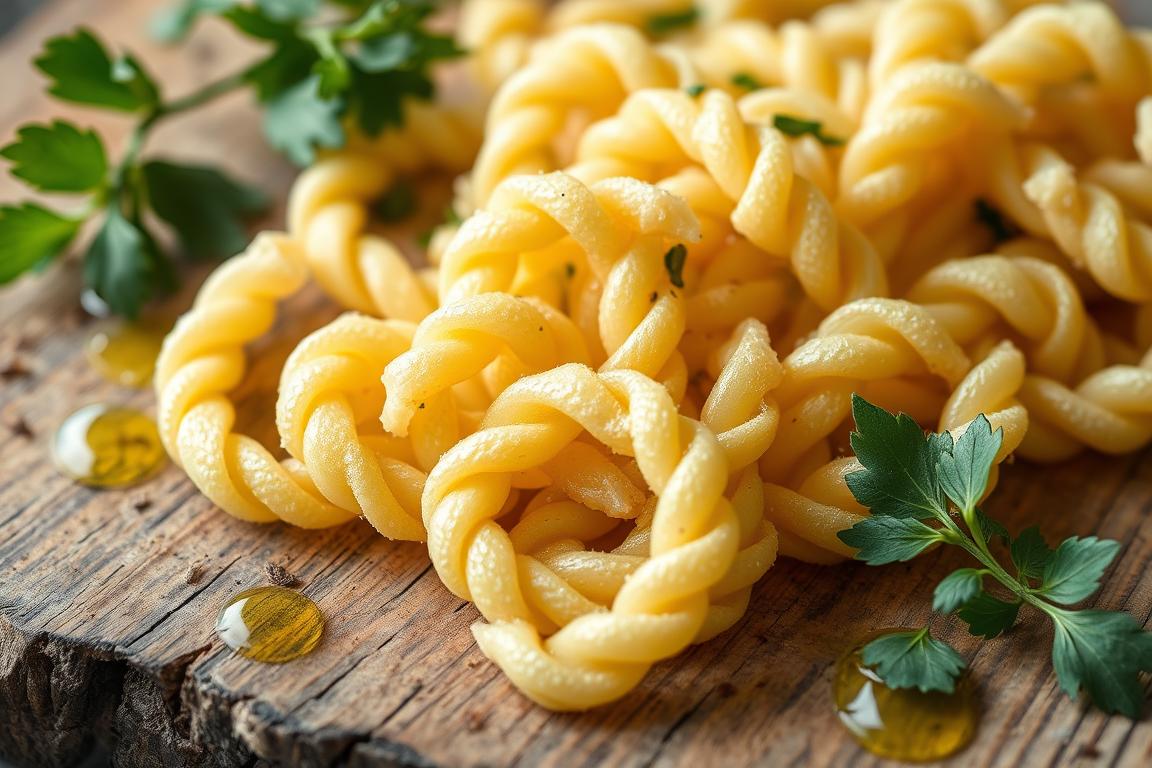Ever thought about finding a substitute for your favorite corkscrew pasta? If you can’t find cavatappi, knowing similar pasta can keep your dish tasty. Cavatappi is loved for its spiral shape that holds onto sauces well. This guide will look at cavatappi and suggest good alternatives when it’s hard to find. For more info on pasta shapes, check out this detailed guide.
Key Takeaways
- Cavatappi is a spiral pasta known for its sauce-holding capabilities.
- It is often shaped like a corkscrew.
- Various pasta types can serve as substitutes when cavatappi is unavailable.
- Understanding the characteristics of cavatappi helps in finding the perfect alternative.
- Maintaining flavor and texture is essential when substituting pasta.
- Considering the dish type can guide you in selecting the best pasta substitute.
Understanding Cavatappi Pasta
Cavatappi pasta is known for its unique spiral shape. This shape makes it great for holding onto sauces. It comes from southern Italy and has become popular worldwide for its versatility and taste.
This pasta is great with both light and heavy sauces. It fits well in many recipes. The spiral shape makes every bite enjoyable, adding to the dining experience. It’s perfect for baked dishes and refreshing salads.
Knowing about pasta varieties is key for using cavatappi well. Like shells and fusilli, it suits simple and complex recipes. It’s a top choice for cooks at home and in restaurants. Whether with creamy cheese or tomato sauce, cavatappi makes any dish better.
Characteristics of Cavatappi
Cavatappi pasta stands out in Italian cuisine with its cavatappi shape and great texture. It has ridges that help sauces stick, making it perfect for rich dishes. The pasta stays firm but tender, ideal for casseroles and salads.
Shape and Texture
The spiral shape of cavatappi catches sauces and ingredients well. Its cavatappi shape has a unique corkscrew design for a fun eating experience. The ridges increase the surface area, making each bite more flavorful.
Material Composition
Cavatappi is mostly made of durum wheat, known for its elasticity and strength. Its dense pasta texture works well with many flavors and cooking methods. It keeps its shape even with long cooking times, making it great for meals.
For more info on different pastas, check out the details on pasta composition. It covers traditional and modern takes on Italian cooking.
Common Uses for Cavatappi
Cavatappi pasta is versatile in many dishes. Its spiral shape and hollow center make it great at holding flavors. This makes it a favorite in many recipes.
Pasta Salads
Cavatappi is perfect for pasta salads. It grabs onto dressings and mix-ins well, boosting the flavor. You can add things like olives, sun-dried tomatoes, and fresh mozzarella to it.
This unique texture makes every bite enjoyable. It’s a hit at summer events and picnics. For tasty pasta salad recipes, try mixing different veggies and proteins.
Casseroles and Hearty Dishes
Cavatappi also excels in baked dishes. It keeps its shape when heated, making it great for casseroles and hearty pasta. When paired with creamy sauces or cheese, it adds a nice texture.
This pasta makes casseroles comforting and satisfying. It’s a go-to for family meals. Chefs love it because it holds up well in the oven, ensuring every bite is tasty and filling.
| Recipe Type | Main Ingredients | Serving Suggestions |
|---|---|---|
| Pasta Salad | Cavatappi, olives, sun-dried tomatoes, mozzarella | Served cold, perfect for outdoor gatherings |
| Casserole | Cavatappi, cheese, creamy sauce, vegetables | Served hot, ideal for family dinners |
| Hearty Pasta Dish | Cavatappi, meat, hearty sauces | Comfort food for colder evenings |
Reasons for Substituting Cavatappi Pasta
Cavatappi is a favorite pasta shape, but sometimes cooks look for other options. Knowing why people switch can help pick the best substitute for a dish.
Dietary Restrictions
People with dietary restrictions often want gluten-free pasta. Pasta made from rice or quinoa can taste and feel similar to cavatappi but is gluten-free. These pasta dietary alternatives are great for those avoiding gluten but still want to enjoy their favorite meals.
Texture and Flavor Preferences
Some cooks like to try different textures or flavors. Whole wheat or chickpea pasta can taste richer and feel heartier, similar to cavatappi. These options let cooks find Pasta flavor profiles they enjoy more.
Availability Issues
It can be hard to find cavatappi at some stores. When that happens, cavatappi substitutes like fusilli or macaroni work well. Choosing a common pasta makes cooking easier and still gives a tasty meal.

What pasta is similar to cavatappi?
Cavatappi is loved for its spiral shape and great at holding sauce. When looking for cavatappi alternatives, several pasta shapes stand out. They share the key qualities of cavatappi and can easily replace it in recipes.
Fusilli has twisted strands like cavatappi. It’s great for salads and casseroles because it holds sauce well. Macaroni is another popular choice with a short, tubular shape. It’s perfect for classic macaroni and cheese.
Penne has angled ends that help sauces stick. It’s versatile and works well in baked dishes and pasta salads.
To see how these options compare, here’s a table showing their features:
| Pasta Type | Shape | Best Uses | Sauce Compatibility |
|---|---|---|---|
| Fusilli | Spiral | Salads, casseroles | Excellent |
| Macaroni | Short tubular | Mac and cheese | Good |
| Penne | Tube with angled ends | Baked dishes, salads | Very good |
Short Tubular Pastas
Short tubular pastas are versatile and popular in many dishes. Penne and macaroni are two main types, each with its own unique qualities. They suit different cooking needs.
Penne
Penne pasta is known for its long, tube-like shape with cuts at each end. This shape helps it hold onto sauces well. It’s perfect for rich, creamy, or tomato-based sauces.
Penne is not just for pasta dishes. It’s great in salads, casseroles, and with many sauces. Try it in your next meal to see how versatile it is.
Macaroni
Macaroni is smaller and curved, a classic in comfort food. It’s often used in macaroni and cheese, where it holds the cheese sauce beautifully. This shows its strength in keeping flavors in.
Macaroni is great for quick meals and is a favorite among kids. It’s versatile, fitting well in baked dishes and salads, adding variety to your meals.
| Pasta Type | Shape | Common Uses | Sauce Pairings |
|---|---|---|---|
| Penne | Cylindrical with diagonal ends | Pasta salads, casseroles, baked dishes | Richer sauces, creamy sauces |
| Macaroni | Short, curved tubes | Mac and cheese, soups, salads | Cheese sauces, lighter sauces |
Spiral Pasta Varieties
Spiral pasta like fusilli and rotini have unique shapes that make dishes more interesting. They are great substitutes for cavatappi. These pastas are not just pretty but also very useful in cooking.
Fusilli
Fusilli pasta is known for its twisted shape. This shape helps it hold onto sauces well. It’s perfect for thick sauces like meat or vegetable ones.
This pasta is great for pasta salads and baked dishes. Its texture and flavor add a lot to the dish.
Rotini
Rotini is a bigger version of fusilli. Its large coils are good for lighter sauces. It’s perfect for baked dishes or hearty meals.
It’s a good choice if you want to try something different from cavatappi. Rotini can hold a lot of sauce, making it very versatile.
| Pasta Type | Shape | Best Uses |
|---|---|---|
| Fusilli | Twisted, spiral | Chunky sauces, pasta salads |
| Rotini | Robust coils | Lighter sauces, baked dishes |
Unique and Novelty Pasta Shapes
Exploring unique and novelty pasta shapes makes meals more fun. Farfalle and rigatoni are great examples. They each have their own texture and style, making them versatile in the kitchen.
Farfalle
Farfalle, or bowtie pasta, is known for its cute pinched design. It’s great for holding onto sauces, whether light or rich. Serving it in salads or with creamy sauces is a hit. The bowtie shape adds a fun touch to any dish.
Rigatoni
Rigatoni has a broad, ridged shape that’s perfect for chunky sauces. It’s also great for baked dishes because it keeps its shape well. Rigatoni is a favorite for many cooks because of its versatility.
| Pasta Shape | Texture | Best For |
|---|---|---|
| Farfalle (Bowtie Pasta) | Delicate and playful | Salads, cream sauces |
| Rigatoni | Sturdy and ridged | Hearty sauces, baked dishes |
Culinary Techniques for Substituting Cavatappi
When looking for substitutes for cavatappi, it’s key to know the right cooking methods. Changing pasta cooking times based on the shape and size of the substitute can make a big difference. For example, fusilli cooks faster than cavatappi because it’s smaller. Getting each pasta to the right doneness is important for the best taste and texture.
Cooking Times and Techniques
Each type of pasta cooks at its own pace. It’s important to follow a general cooking time but also consider what you like the texture to be. Here’s a look at how long different pasta shapes take to cook:
| Pasta Type | Cooking Time (minutes) | Notes |
|---|---|---|
| Cavatappi | 9–11 | Traditional cooking time for firm texture |
| Fusilli | 7-9 | Cooks faster, ideal for quick dishes |
| Macaroni | 6–8 | Perfect for creamy pasta salads |
| Penne | 11–13 | Maintains structure well with hearty sauces |
Sauce Pairing
Choosing the right sauce is key when swapping out cavatappi. The right pasta and sauce compatibility can really boost the flavor. Creamy sauces like Alfredo go great with many substitutes, while chunky sauces like tomato sauce are better with certain shapes. Here are some sauce suggestions for different pasta types:
- Alfredo Sauce – Pairs excellently with fusilli
- Pesto Sauce – Complements penne or rigatoni
- Marinara Sauce – Works wonderfully with macaroni or cavatappi
- Carbonara – Ideal for shorter shapes like fusilli
Alternative Pastas for Specific Dishes
Choosing the right substitute for cavatappi in specific pasta dishes is key. The shape and texture of the pasta can change how the dish turns out. For example, fusilli is great for pasta salads because it holds dressings well. Rigatoni works well in baked dishes thanks to its ridged surface and tube shape.
Knowing which pastas work best together keeps the dish tasting great. With options like penne and farfalle, you can mix up the texture while keeping the flavor. Each pasta shape adds its own twist, making it fun to try new recipes.
| Original Pasta | Substitute Pasta | Description |
|---|---|---|
| Cavatappi | Fusilli | Ideal for pasta salads; captures dressings well. |
| Cavatappi | Rigatoni | Perfect for baked dishes; holds sauces and cheese effectively. |
| Cavatappi | Penne | Great for creamy sauces; provides a firm bite. |
| Cavatappi | Farfalle | Offers a unique visual appeal; pairs well with lighter sauces. |
Trying out different alternatives lets you get creative with your dishes. It also helps you meet various dietary needs. Using the right substitute pastas makes cooking easier and meals more enjoyable.
Considering Non-Pasta Substitutes
Non-pasta substitutes meet different dietary needs and cooking goals. They bring new textures and tastes to meals. These options are great for those who need gluten-free meals or want to try new pasta dishes.
Grain and Cereal Alternatives
Rice and quinoa are great as non-pasta substitutes. They are nutritious and work well in many recipes. Quinoa is especially good for gluten-free diets because it’s high in protein and versatile.
Vegetable-Based Options
Vegetable substitutes are popular for those looking for low-calorie pasta alternatives. Spiralized veggies, like zoodles, look and feel like pasta but are healthier. They add more nutrients to meals and open up new cooking ideas. Learning about pasta shapes can help use these substitutes creatively.
Cooking Tips for Pasta Substitutes
When looking for substitutes for cavatappi, it’s important to use the right cooking tips. Focus on cooking times and sauce pairing. A big pot of salted boiling water is key for the best texture and flavor.
Each type of pasta has its own cooking needs. Using the right method makes sure the substitute looks and tastes great. For example, rotini and penne might cook faster to stay firm.

Choosing the right sauce for your pasta can also make a big difference. Cream sauces go well with rotini, while tomato sauces are better with rigatoni. Knowing what each pasta is best with helps with meal planning.
| Pasta Type | Texture | Suggested Sauce Pairing |
|---|---|---|
| Rotini | Spiraled, holds sauce well | Creamy sauces |
| Rigatoni | Large, tubular | Chunky tomato sauces |
| Penne | Diagonal cut, firm | Pesto or olive oil |
| Farfalle | Bow-tie shape, slightly chewy | Light vinaigrettes |
| Fusilli | Twisted, absorbs flavor | Spicy marinara sauces |
For more tips on substitutions and recipes, check out this resource. Using these tips will make cooking with pasta substitutes a breeze, ensuring great results.
Conclusion
Cavatappi might not always be easy to find, but there are many pasta substitutes. Fusilli, rigatoni, and macaroni can replace it and keep dishes tasty. These options let cooks be creative and make sure meals are yummy and fulfilling.
Knowing about these substitutes is important for keeping recipes tasty. Whether you’re making a cheesy pasta bake or a big pasta salad, picking the right substitute helps. It makes cooking easier and more fun. This shows how many choices there are for those who want to use cavatappi substitutes.
When you face challenges like not having certain ingredients, being creative in the kitchen is key. Trying out different types of pasta can bring new flavors and looks to your dishes. This proves that there are many ways to make great pasta, even without cavatappi.


